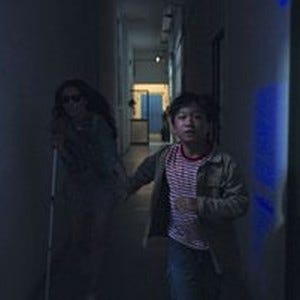It’s with some trepidation that I approach any Dario Argento film these days, as to say his last few have been unsatisfactory is an understatement, so I am elated to say that while this isn’t a total return to form for the maestro it’s at least a solid giallo with some genuinely tense moments.
While it’s not going to sit alongside Argento’s masterworks like Deep Red, Suspiria, Opera, or Tenebrae, Dark Glasses is at least Argento’s best film in nearly two decades.
A serial killer in Rome is targeting prostitutes and after refusing a few sketchy clients, Diana runs afoul of this killer. While perusing her in his white van, the killer causes an accident that blinds Diana and makes an orphan of Chin, a young Asian boy whose parents are killed in the gruesome car crash. Escaping the orphanage, Chin goes to stay with the now blind Diana while the killer stalks them.
The idea of a recently blinded protagonist being terrorized isn’t a new concept, it’s been around for decades, most famously in Terence Young’s Wait Until Dark where a blind Audrey Hepburn runs afoul of Alan Atkin and his gang, so this film is more about the execution. Argento has always been more about style than substance, so this isn’t really a problem. Like most of Argento’s films, it is short on logic and relies on the director’s keen eye and camera movements along with a great score to keep the tension, so you’re in for a ride even if the ride doesn’t always make perfect sense and some characters do utterly stupid things. In other words, it’s a giallo.
An excellent pulse-pounding score and the effects work of Sergio Stivaletti are definitely the highlights here, but I should also point out that I genuinely like Diana, who comes across as a woman of conviction and rises to the occasion when she has to protect not only herself, but this young orphan. She’s a genuinely likable character, which you don’t always see in this type of film, and the fact that she’s a prostitute plays against the more American stereotype of sex equals bad in horror movies.
The downside here is that I feel the killer was revealed way too early into the film. There’s really no twist either. I was expecting a late departure like Opera, where while it didn’t make sense, at least there was an unexpected coda. This film doesn’t have one, and it’s just a matter of fact ending. Sure, this eliminates the wacky and fantastical twists like the killer being a dwarf like in one Argento film, but the ending still feels less than satisfactory as I expected one final twist that never came.
Overall, though, this is one has a lot of thrills and solid visuals. Argento showed that despite a few misfires in his last few films, he can still pull out a solid giallo… just don’t expect it to be on par with the films he made 40-50 years ago.






